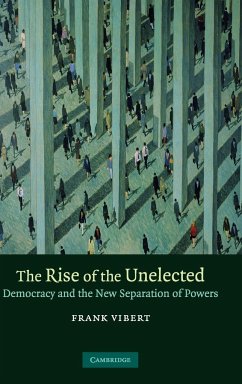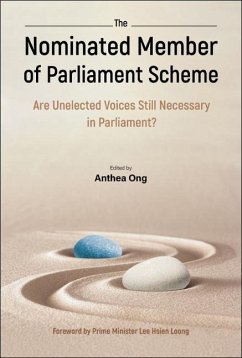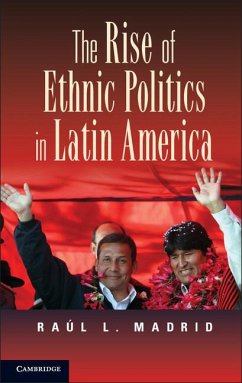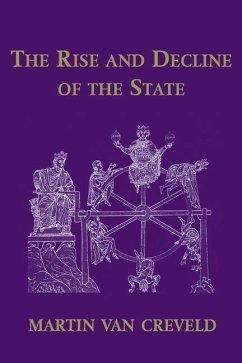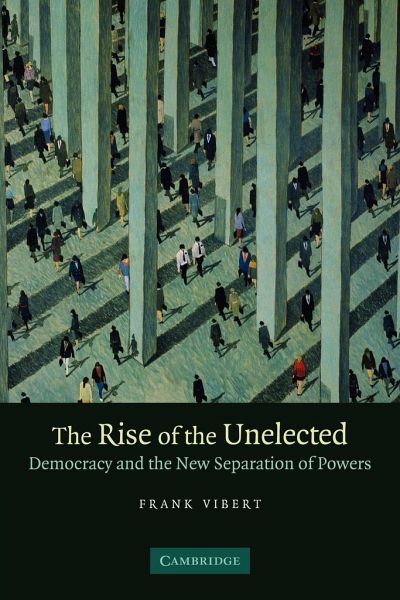
The Rise of the Unelected
Democracy and the New Separation of Powers
Versandkostenfrei!
Versandfertig in 1-2 Wochen
42,99 €
inkl. MwSt.
Weitere Ausgaben:

PAYBACK Punkte
21 °P sammeln!
Examines the rise in importance of unelected bodies and the challenge they present to democracy.Unelected bodies, such as independent central banks, economic regulators, risk managers and auditors have become a worldwide phenomenon. Democracies are increasingly turning to them to demarcate boundaries between the market and the state, to resolve conflicts of interest and to allocate resources, even in sensitive ethical areas such as those involving privacy or biotechnology. This book examines the challenge that unelected bodies present to democracy and argues that, taken together, such bodies s...
Examines the rise in importance of unelected bodies and the challenge they present to democracy.
Unelected bodies, such as independent central banks, economic regulators, risk managers and auditors have become a worldwide phenomenon. Democracies are increasingly turning to them to demarcate boundaries between the market and the state, to resolve conflicts of interest and to allocate resources, even in sensitive ethical areas such as those involving privacy or biotechnology. This book examines the challenge that unelected bodies present to democracy and argues that, taken together, such bodies should be viewed as a new branch of government with their own sources of legitimacy and held to account through a new separation of powers. Vibert suggests that such bodies help promote a more informed citizenry because they provide a more trustworthy and reliable source of information for decisions. This book will be of interest to specialists and general readers with an interest in modern democracy as well as policy makers, think tanks and journalists.
Review quote:
'This book is essential reading for all those concerned with the accountability of expert bodies, such as regulators, appointed with specific responsibilities and acting independently from ministers. Frank Vibert shows how an extension of the constitutional doctrines of the separation of powers provides a practical framework for their legitimacy. In a society increasingly dependent on knowledge, he highlights the importance of not focusing exclusively on politics as a means through which democratic societies engage in reasoned problem solving.' Sir Ian Byatt, Chairman, Water Commission for Scotland and Former Director General of Water Services (Ofwat)
'Vibert is right that too little attention has been paid to the implications of widespread outsourcing of government functions to unelected bodies. Furthermore, he proposes practical ways in which the accountability gap can be filled. This is a very valuable book.' Howard Davies, Director, LSE
'Frank Vibert's provocative and timely thesis represents a wake-up call to parliamentarians and all those who care about efficient, responsive and accountable public administration.' Rt Hon Lord Holme of Cheltenham, Chairman, House of Lords Select Committee on the Constitution
Table of contents:
Introduction; 1. The world of the unelected; 2. The driving forces; 3. The advantages of the new separation of powers; 4. The challenge to conventional democratic theory; 5. Adapting traditional approaches; 6. The new separation of powers and the advent of the informed citizen; 7. Informed citizens and the changing role of traditional institutions; 8. The legitimacy of the new branch; 9. The new separation of powers and the European Union; 10. International institutions: blurring the boundaries; 11. Conclusions: the accountability of the new branch.
Unelected bodies, such as independent central banks, economic regulators, risk managers and auditors have become a worldwide phenomenon. Democracies are increasingly turning to them to demarcate boundaries between the market and the state, to resolve conflicts of interest and to allocate resources, even in sensitive ethical areas such as those involving privacy or biotechnology. This book examines the challenge that unelected bodies present to democracy and argues that, taken together, such bodies should be viewed as a new branch of government with their own sources of legitimacy and held to account through a new separation of powers. Vibert suggests that such bodies help promote a more informed citizenry because they provide a more trustworthy and reliable source of information for decisions. This book will be of interest to specialists and general readers with an interest in modern democracy as well as policy makers, think tanks and journalists.
Review quote:
'This book is essential reading for all those concerned with the accountability of expert bodies, such as regulators, appointed with specific responsibilities and acting independently from ministers. Frank Vibert shows how an extension of the constitutional doctrines of the separation of powers provides a practical framework for their legitimacy. In a society increasingly dependent on knowledge, he highlights the importance of not focusing exclusively on politics as a means through which democratic societies engage in reasoned problem solving.' Sir Ian Byatt, Chairman, Water Commission for Scotland and Former Director General of Water Services (Ofwat)
'Vibert is right that too little attention has been paid to the implications of widespread outsourcing of government functions to unelected bodies. Furthermore, he proposes practical ways in which the accountability gap can be filled. This is a very valuable book.' Howard Davies, Director, LSE
'Frank Vibert's provocative and timely thesis represents a wake-up call to parliamentarians and all those who care about efficient, responsive and accountable public administration.' Rt Hon Lord Holme of Cheltenham, Chairman, House of Lords Select Committee on the Constitution
Table of contents:
Introduction; 1. The world of the unelected; 2. The driving forces; 3. The advantages of the new separation of powers; 4. The challenge to conventional democratic theory; 5. Adapting traditional approaches; 6. The new separation of powers and the advent of the informed citizen; 7. Informed citizens and the changing role of traditional institutions; 8. The legitimacy of the new branch; 9. The new separation of powers and the European Union; 10. International institutions: blurring the boundaries; 11. Conclusions: the accountability of the new branch.





